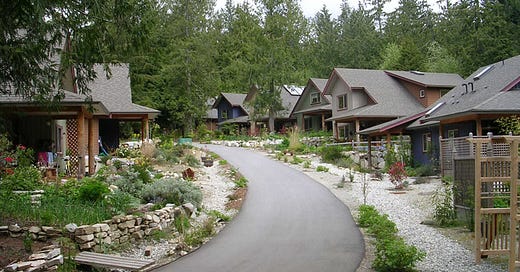Cohousing offers hope in a challenging housing market
Cohousing communities, micro and macro, are popular in western Canada
Anyone who’s tried to find a place to live in Squamish, BC, knows that it has become increasingly challenging in recent years, as people move out of Vancouver to find affordable housing and housing becomes a challenge for many people working in the resort community of Whistler.
In such a challenging housing market, Dave Ransier’s Responsible LIving Squamish is a beacon of hope. Local folks in Squamish, BC, say that by blending affordability, community, and sustainability, it offers a balanced, humane approach to urban living.
His 4,200-square-foot building welcomed its first cohousing tenants in Dentville, on the outskirts of Squamish, BC, in September 2022. Most were in their late 20’s and early 30’s. And now he wants to scale up.
“I’ve already bought another property in Squamish that I’ll turn into shared housing, and I start construction on that this year,” he told Maclean’s Magazine. “I also plan to act as a consultant for other people who want to build or invest in these shared homes.” Then he plans to start on what he calls his retirement project - sharing the model more widely.
Each soundproofed bedroom suite in Britannia House can accommodate a queen bed, two-seat sofa, desk and bathroom. Residents share two kitchens, two dining areas and a gym in the garage. Tenants can grow vegetables in raised garden beds in the front yard, and they built a sauna and cold plunge pool in the backyard. Rent is $1,400 to $1,600 per month.
It’s a more formal approach to something that often happens informally, Ransier says. "People get together and rent a house. The problem with that is that someone sells the house, and everybody gets kicked out. Or you get a couple of people who move out because something's changed — someone’s got a job somewhere else."
Given the success of the first building, he’s now considering other specialized communities—perhaps one for seniors and another for single parents, says the Squamish Chief. Co-housing is more common in Europe, Ransier says, although it does seem to be catching on in western Canada.
Since the first Canadian cohousing development was created in Langley, B.C., 13 cohousing communities have been built, according to the Canadian Co-Housing Network.
Ten are in British Columbia: Belterra Cohousing (Bowen Island, BC); Cranberry Commons (Burnaby, BC); Creekside Commons (Courtenay, BC); Harbourside (Sooke, BC); Middle Road (Nelson, BC); Pacific Gardens (Nanaimo, BC); Vancouver Cohousing (Vancouver, BC); Windsong (Langley, BC); Quayside Village (North Vancouver, BC); and Roberts Creek Cohousing (Roberts Creek, BC).
The others are: Terra Firma Cohousing in Ottawa, Ontario; Wolf Willow Cohousing in Saskatoon, SK; and Prairie Sky in Calgary, Alberta.
Ransier, who began developing townhouses and entry-level homes in Squamish in the 1990s, saw the housing unaffordability challenge at first hand. He saw friends in Squamish and Vancouver competing with 20 or more people to rent an apartment or a room in a house in Squamish.
About 2018, he got interested in communal living and co-housing models as sustainable long-term options, and in 2019, he bought the lot in Dentville and tore down the old house that sat on it.
But the province’s process for building large-scale housing projects is bureaucratic, convoluted, and lengthy. So he wondered if he could build a micro-community of a dozen residents and finish the project in 18 months or two years. Once completed, he advertised the homes through social media, Craigslist and word of mouth.
The idea of cohousing began in Denmark in the winter of 1964 with Danish architect Jan Gudmand-Hoyer and a group of friends. They bought a site and developed plans but neighbours objected, and so nothing was built.
But in 1967 and 1968, two articles published in national newspapers attracted a lot of interest from a total of 150 families. By 1976, three communities had been built - Saettedammen, Skraplanet, and Nonbo Hede. By 1982, 22 owner-occupied cohousing communities had been built in Denmark.
After initial skepticism, cohousing won the support of the Danish government and financial institutions, and cohousing is now a well-established housing option in Denmark. Not only do new communities continue to be built, but the concept has been incorporated into master plans for large areas of new development.





A couple of years ago a few of us visited the coop in Sooke and were impressed.